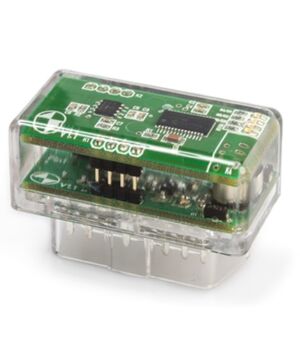Have any questions?
+44 1234 567 890



Self-learning
The new OBD killer learns the stored fault codes and is therefore suitable for all sporadic emissions related fault codes.

Automatically
While driving, the engine control unit is monitored in real time for fault codes.

Fast
While driving, the engine control unit is monitored in real time for fault codes.

Universal
For almost any vehicles from 2008 onwards. The OBD killer is simply plugged into the diagnostic port.
Order now the OBD-Killer with 30-days money-back-warranty!
Frequently asked questions
What is the OBD-Killer?
"OBD" stands for "On-Board-Diagnostics", the standardised diagnostic port of motor vehicles. The OBD-Killer is a compact electronic module that is simply plugged into this diagnostic port. There it monitors the fault memory of the engine control unit in real time for possible entries. If a pending fault code is detected in the memory, the OBD-Killer blocks it even before the driver can see a message in the dashboard.
What is the OBD-Killer doing?
The OBD-Killer constantly monitors the fault code memory of the engine control unit. As soon as a code is present, the OBD-Killer intervenes immediately. It removes the pending fault code even before it is finally stored in the fault code memory. If a fault code has already been stored before the OBD-Killer is installed, this is also removed.
For which vehicles?
You can use the OBD-Killer on all vehicles from model year 2008. There are also vehicles that already support the necessary standard in the years before that. You can recognise these vehicles by the fact that pin 6 and pin 14 are connected to the diagnostic connection. It does not matter whether the engine runs on diesel, petrol, natural gas or LPG. Some engine control units do not support the clearing of fault codes while driving. The OBD killer is then not suitable for these vehicles.
Which fault codes?
The OBD-Killer is capable of learning and can generally block all emission-related fault codes. During installation, the OBD killer learns the stored fault codes as expected ones. This process can be repeated as often as desired.
One of the most frequent errors is, for example, the code P0401 in connection with coked EGR valves. But the error code P0420 also occurs very often, e.g. with aged catalytic converters. Manufacturer-specific codes that do not comply with the OBD standard are also deleted.
The OBD-Killer is frequently used for deleting the sporadic fault codes which appear after an OPF-removal (Otto-Particulate-Filter) or cat-removal (catalytic converter).
As soon as a fault code occurs that was not expected, the OBD killer no longer intervenes. Thus, the full functionality of the fault memory and engine control light is retained for all other fault messages.
Where is it used?
The OBD-Killer is ideal for all sporadically occurring, exhaust-relevant faults such as P0400, P0401, P0402, P0403, P0404, P0405, P0406, P0407, P0408 (exhaust gas recirculation): Often, after repairing the exhaust gas recirculation, sporadic error messages occur again, which often cannot be adequately clarified. Here, the OBD killer is a favourable alternative to the multiple replacement of all components. The catalytic converter error class (P0420, P0421, P0422, P0423, P0424, P0430, P0431, P0432, P0433, P0434) is different. Often the engine control unit repeatedly reports a faulty catalytic converter, although it is still in order. This happens, for example, when using sports catalytic converters. In the case of performance upgrades or unexplained turbocharger problems, error code P0234 often occurs: Boost pressure control limit exceeded. It is also possible to use it in motor sports, e.g. if the OPF/GPF is to be removed (OPF/GPF-Delete)
In case of vehicle change?
When changing vehicles, you can continue to use the OBD-Killer for all vehicles built from 2008 onwards without any problems. If the OBD-Killer detects a new chassis number after installation, all learning values are reset. The OBD-Killer is then virtually brand new.
Repairs are obsolete now?
No. The OBD killer should only be used when a repair could not fix the problem or no fault is found. Instead of replacing all parts again, the OBD-Killer is the better solution for the wallet and saves environmental resources.